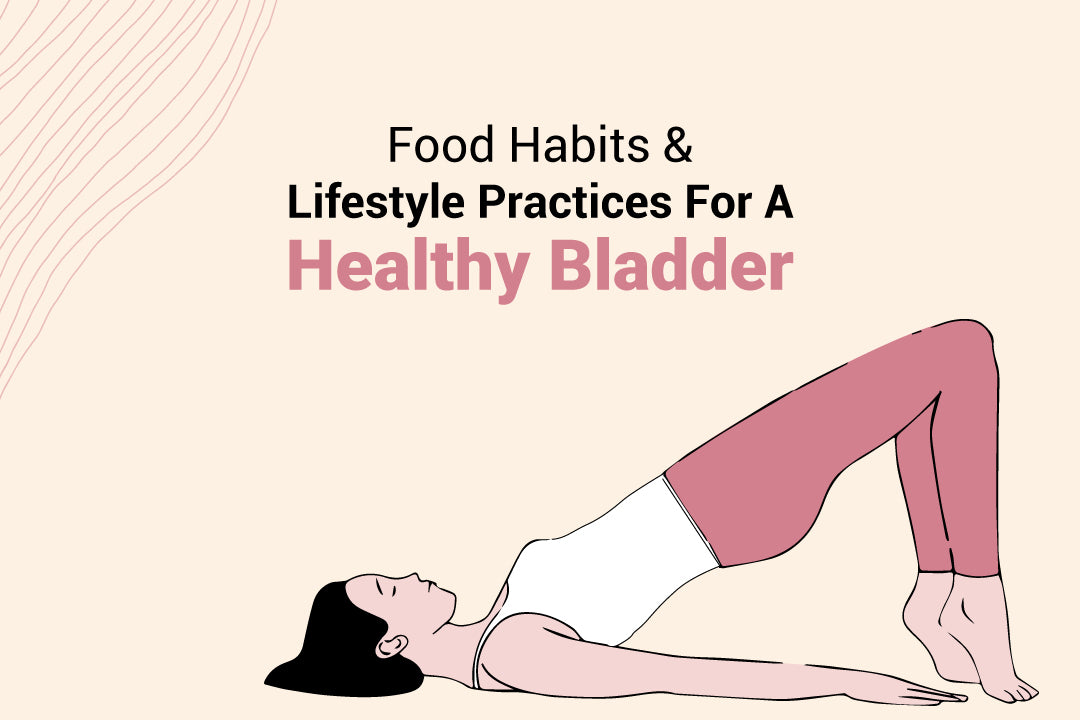Food Habits & Lifestyle Practices for A Healthy Bladder

Food Habits & Lifestyle Practices for A Healthy Bladder
There is no full-proof diet that can cure incontinence, but certain food habits and lifestyle changes can be adapted to help manage a leaky bladder better. Monitoring your fluid and dietary intake can sometimes help draw a relation between what irritates your bladder and what changes need to be made accordingly. When it comes to managing your bladder more effectively, one needs to:
Watch the Fluids. Caffeine is considered to act as a bladder irritant and can directly impact bladder smooth muscles, leading to urge incontinence. One needs to avoid caffeinated drinks such as tea, coffee, drinking sodas, or even hot chocolate.
A person suffering from incontinence may think that limiting their water intake would help them manage their condition better and would reduce their bathroom visits. However, drinking less water can lead to dehydration and make the urine more concentrated, which can further irritate the bladder.
When it comes to fluids, water is the best. You can consult your doctor to ask for the proper water intake for you.
Avoid High Acid Foods. One also needs to steer away from high-acid foods, including tomatoes, raw onions, spicy Chinese or Mexican food, tropical juices like cranberry juice, orange juice, and other citrus-based drinks that can act as catalysts for bladder leaks.
Restrict Alcohol. Alcohol acts as a diuretic that may trigger urine urgency. Our bladder gives a signal to the brain that in turn signals our body to urinate. Too much alcohol intake may sometimes impair our brain’s ability to comprehend these signals effectively.
Quit Smoking. Smoking puts one further at risk of developing urinary incontinence. Smoking may lead to a chronic cough that further weakens the pelvic floor muscles, leading to stress incontinence.
Go High on Veggies and Fruits. Maximize on the vegetables and high-fiber foods including potatoes, green peas, chia seeds, flax seeds; pulses such as lentils and beans; whole grains like quinoa, brown rice, oats, wholemeal pasta, and wholemeal bread. One can also incorporate fruits such as apples, pomegranate, pears, bananas, avocadoes, etc., that are high in fiber. Lean meats such as pork, chicken, fish, especially when steamed or broiled, can be quite bladder friendly as well.
Develop Good Toilet Habits. First and foremost, one needs to give up on the ‘just in case’ peeing. Every time you step out of your home, don’t try to urinate even if the bladder is not full. One doesn’t want to train the bladder to signal the brain even if it’s not full yet. Secondly, take planned bathroom visits every 2-4 hours. This will slowly train your bladder and make it healthier. While passing urine, take your time on the toilet. Do not force or push your pelvic muscles to pass urine quickly.
Hover peeing has become the need of the hour given the sad state of public toilets. This, however, puts a strain on the pelvic floor muscles and sometimes stops the bladder from getting fully emptied. Try to opt for pee funnels that let you stand and pee without the risk of catching infections from unknown surfaces. Holding urine for longer can also lead to UTIs and irritate your bladder; stand-and-pee devices come in really handy in such cases.
Lastly, one should visit the toilet only when there is an urge to pass a bowel motion. Staying on the toilet seat for long can lead to constipation. Make sure no strain is applied on the bowels, and a proper posture is maintained on the toilet.
Kegal Your Way to A Healthy Life. Kegels or Knacks are an effective way to manage mild to moderate incontinence in both men and women. Your pelvic floor muscles are the ones that hold urine in the bladder, and strengthening these muscles with Kegels will help keep urine from leaking every time you laugh, sneeze or cough. To do Kegels, contract or pull in your pelvic floor muscles (these are the muscles you use to stop urine flow), hold for 3-5 seconds, and then release. Repeat this 8-10 times a day, at least thrice a week.
Manage Incontinence. Incontinence can affect a person’s lifestyle and independence. A leaky bladder may not be possible to cure but can be managed with the right incontinence products. For mild to moderate incontinence, one can opt for adult diapers available in varying sizes and absorption capacities. These are available in different fits as well, depending on a person’s mobility. Light Inco pads are also available for mild incontinence that can usually absorb up to 400 ml of fluids.

